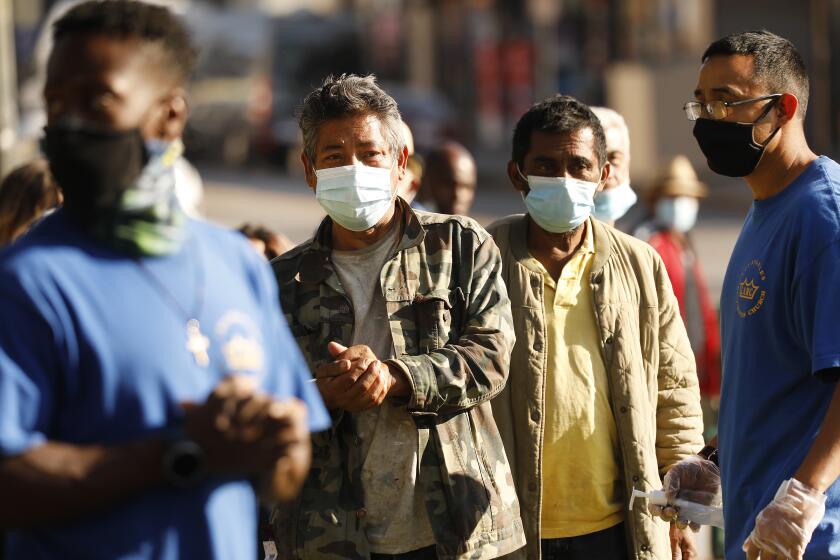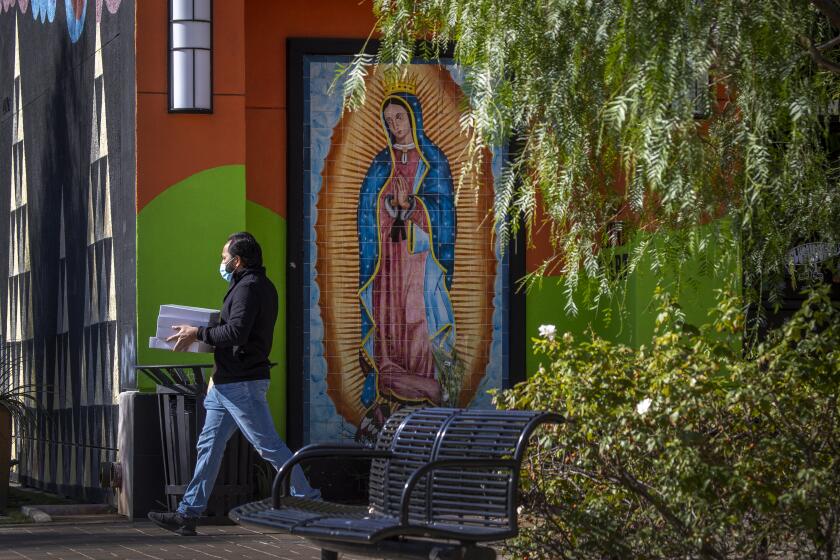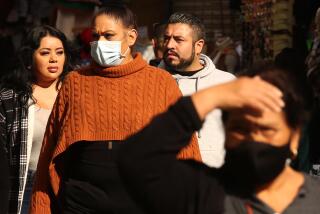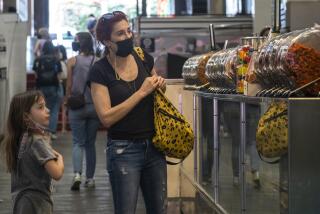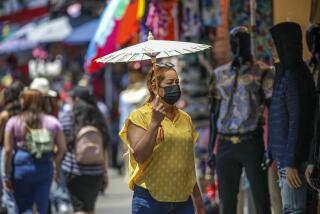Coronavirus curfew: Here’s how law enforcement agencies will — or won’t — enforce it
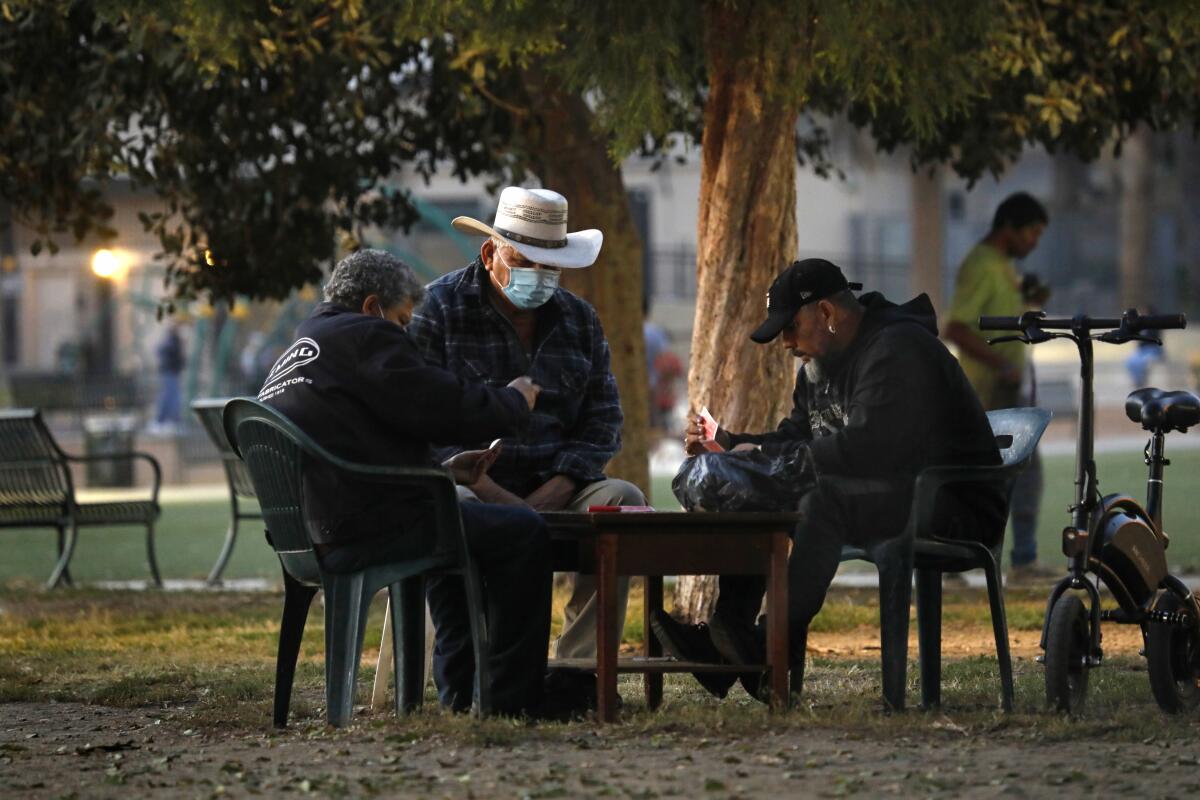
Despite a major surge in coronavirus cases, many Southern California policing agencies say they’re taking an education-first approach to the new curfew that takes effect for much of the state Saturday rather than aggressive enforcement.
The limited stay-at-home order, which officials hope will help stem an unprecedented surge in new coronavirus cases, will prohibit most nonessential activity outside the home from 10 p.m. to 5 a.m. in counties in the strictest, purple tier of the state’s four-phase color-coded reopening plan. Roughly 94% of Californians live in these counties, including Los Angeles, Orange, San Bernardino, Riverside and San Diego.
L.A. County also has a separate restriction that requires restaurants and nonessential stores to close their doors to the public at 10 p.m., although takeout and delivery services can continue after that time.
Restaurants and nonessential stores must close at 10 p.m. and outdoor gatherings are capped at 15 people, as COVID-19 spreads at a rapid rate.
The L.A. County Sheriff’s Department, hoping people will comply with the new rules voluntarily, will turn to criminal enforcement measures only as “an extreme last resort,” a policy it has observed since the first stay-at-home orders were issued in March, Sheriff Alex Villanueva said Thursday in a statement.
“We trust in the community and rely on people to assess risk and take precautions as appropriate,” he said.
Villanueva told KTTV-TV Channel 11 that the department will focus its efforts on nonessential businesses that don’t close at 10 p.m. as required.
“If we get a complaint, we will obviously investigate, we’ll respond to the location, we’ll contact the owner and ask them to comply and then, if they don’t, we have the option then of doing a citation,” Villanueva said. “We can also prepare a criminal report for violating a health order, and we’ll turn it over to the Department of Public Health and let them decide what to do with it.”
Similarly, Los Angeles Police Department officers will help check whether businesses are complying with public health rules, including the curfew, the department said.
The city attorney’s and mayor’s offices will work to identify businesses that aren’t following regulations, and disaster service workers will observe the establishments during business hours and open complaints if necessary, Capt. Stacy Spell, an LAPD spokesman, said in a statement.
“During off-hours, that list of locations will be provided to the department, and a call for service will be generated by [the] communications division directing a patrol unit and a supervisor to respond and determine if there is compliance,” Spell said. “If the business is found to be noncompliant, a complaint application will be created.”
As of Friday morning, LAPD was still awaiting directions from command staff on exactly how to enforce the broader curfew. Spell said the department would provide guidance to officers before the curfew takes effect.
“However, it is our shared responsibility to slow the spread of COVID, and we encourage all Angelenos to follow public health guidelines, which include wearing masks in public, social distancing, washing hands and adhering to commercial business guidelines,” he said.
Los Angeles County reported nearly 5,000 new coronavirus cases Thursday, the highest single-day count so far. A look at what could be next.
Law enforcement agencies in neighboring counties also emphasized that message of personal culpability. Some went a step further and said they wouldn’t respond to calls for service alleging people aren’t complying with public health rules, including the new curfew.
“Let me be clear — this is a matter of personal responsibility and not a matter of law enforcement,” Orange County Sheriff Don Barnes said in a statement. “Orange County sheriff’s deputies will not be dispatched to, or respond to, calls for service to enforce compliance with face coverings, social gatherings or stay-at-home orders only.”
Deputies will still respond to calls alleging criminal behavior or threats to life or property, he said.
The San Bernardino County Sheriff’s Department said it would continue to refer people who report violations of public health orders to the county’s joint information center so complaints can be triaged and assigned to the appropriate department.
“It is not our intent to utilize patrol personnel to respond to these allegations,” the department said in a statement. “We trust that members of the communities we serve will act responsibly and demonstrate good judgment to do their part to slow the spread of the virus.”
Riverside County Sheriff Chad Bianco, an outspoken opponent of stay-at-home restrictions since early on in the crisis, also said it has been his department’s policy to encourage personal responsibility.
“To ensure constitutional rights are not violated and to limit potential negative interactions and exposure to our deputies, we will not be responding to calls for service based solely on noncompliance with the new order or social distancing and mask guidelines,” Bianco said in a statement.
By contrast, San Diego County Sheriff Bill Gore said he would assign eight full-time deputies to help investigate health order complaints and quickly issue citations when residents refuse to comply.
“When we can’t mitigate the situation that we’re dealing with, that’s when the deputy sheriffs are there to take enforcement action, either through citations or writing case reports to go to the district attorney or, in the city of San Diego, the city attorney there,” Gore said Thursday.
The sheriff said his department has already obtained cooperation with police departments in cities that do not contract with the county for law enforcement services. Oceanside, Carlsbad, San Diego, Chula Vista and Coronado have, he said, signaled their willingness to cooperate with the county enforcing health rules within their jurisdictions.
San Diego Union-Tribune staff writer Paul Sisson contributed to this report.
More to Read
Start your day right
Sign up for Essential California for news, features and recommendations from the L.A. Times and beyond in your inbox six days a week.
You may occasionally receive promotional content from the Los Angeles Times.
